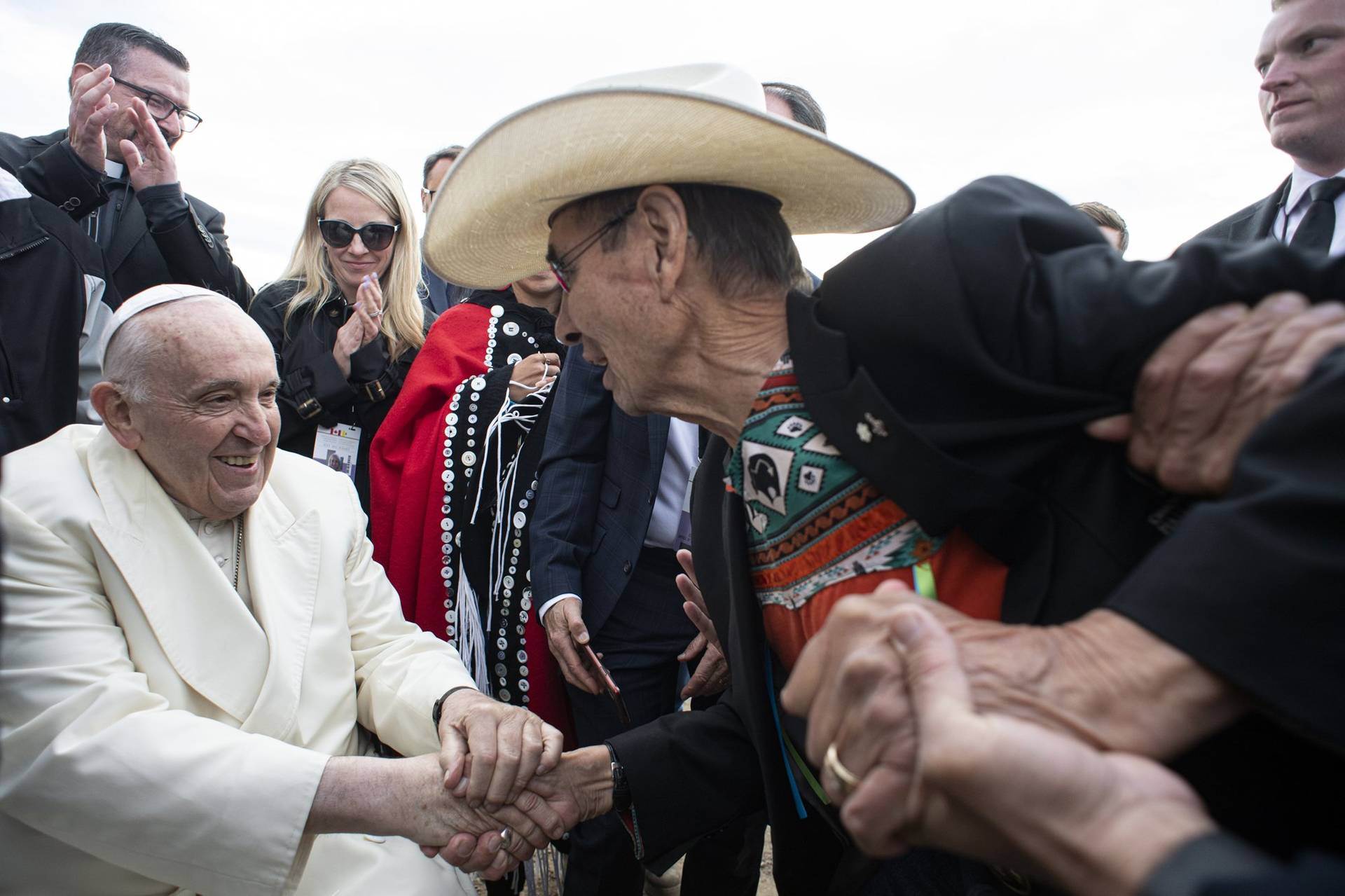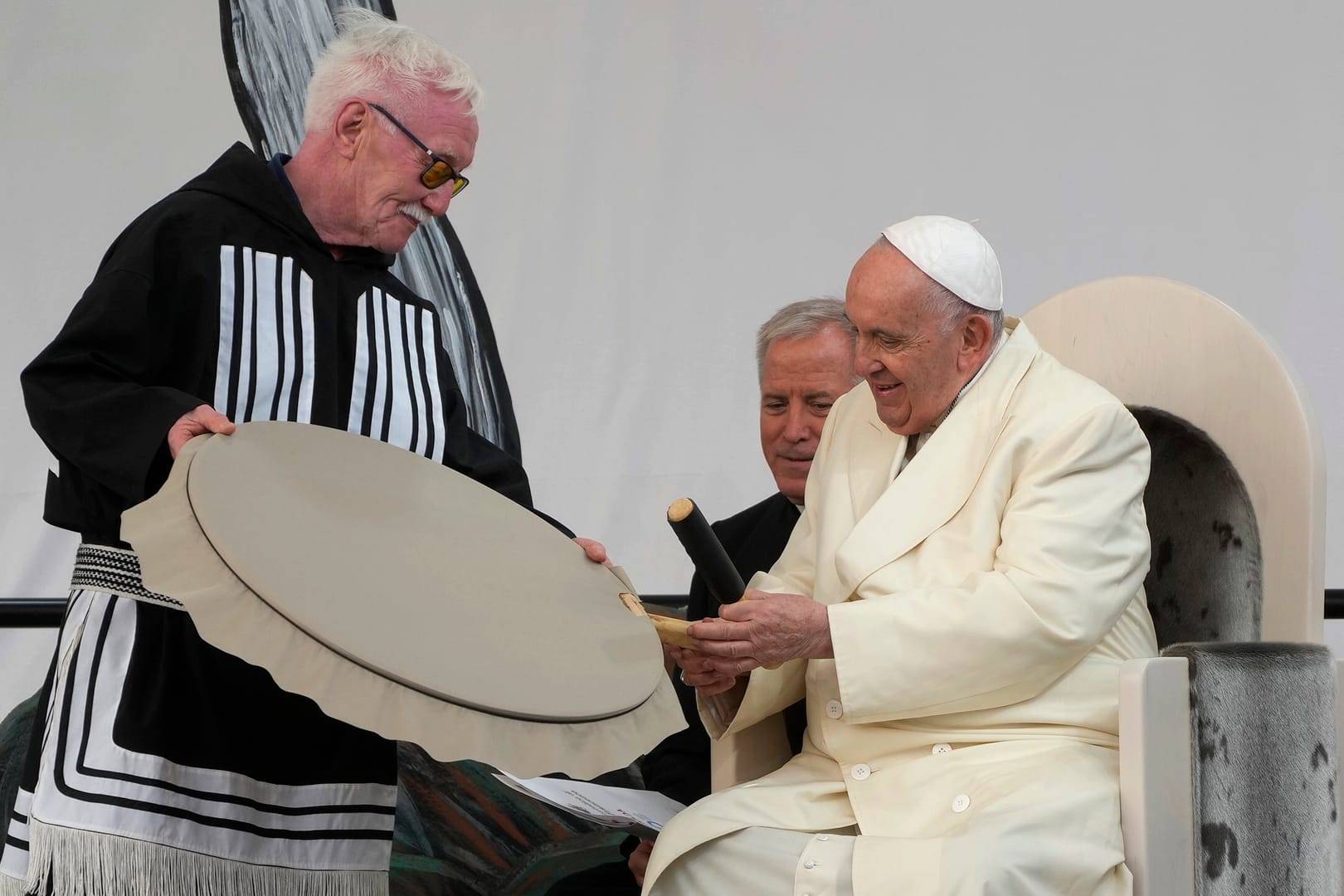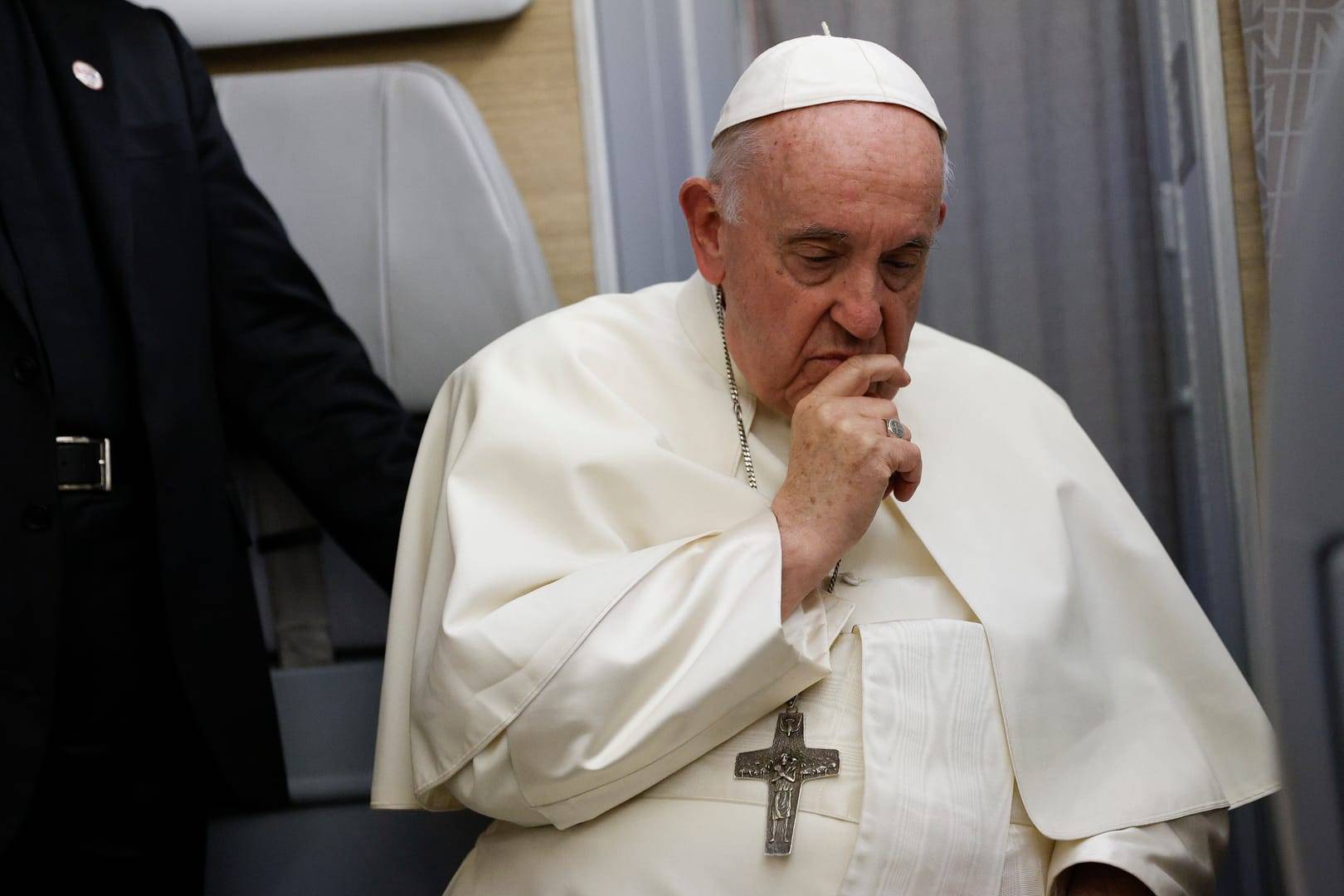ROME – In his first public event in Canada after landing in Edmonton yesterday, Pope Francis met with members of different Indigenous communities, offering a highly-anticipated apology for the Catholic Church’s role in what’s been described as a “cultural genocide” associated with the country’s residential school system.
Speaking to members of the First Nations, Métis and Inuit communities on the grounds of the former Ermineskin residential school in Maskwacis, Alberta, Pope Francis Monday said the land he was standing on “preserves the scars of still open wounds.”
“I am here because the first step of my penitential pilgrimage among you is that of again asking forgiveness, of telling you once more that I am deeply sorry,” he said, and apologized “for the ways in which, regrettably, many Christians supported the colonizing mentality of the powers that oppressed the Indigenous peoples. I am sorry.”
Francis asked forgiveness for the ways in which members of the Catholic Church, especially members of religious communities, cooperated “in projects of cultural destruction and forced assimilation promoted by the governments of that time, which culminated in the system of residential schools.”
While not every part of the legacy of the residential schools is bleak – devotion and charity were also present – Pope Francis said the overall impact of the policies that led to the residential schools “were catastrophic.”
Christian faith, he said, “tells us that this was a disastrous error, incompatible with the Gospel of Jesus Christ.”
Francis said it is painful for him to think of how the values, language, and culture of Indigenous communities “was eroded, and that you have continued to pay the price of this.”
“In the face of this deplorable evil, the church kneels before God and implores his forgiveness for the sins of her children,” he said. “I myself wish to reaffirm this, with shame and unambiguously. I humbly beg forgiveness for the evil committed by so many Christians against the Indigenous peoples.”
Pope Francis issued his apology on the first full day of his July 24-30 trip to Canada, which takes him to Edmonton, Quebec, and the remote city of Iqaluit.
His visit to Canada is unique in that, differently than a formal state or pastoral visit, the decision to go was made specifically for the purpose of apologizing for the church’s historic role in the running of many of Canada’s residential schools.
For more than a century, Canada’s residential school system attempted to assimilate Indigenous communities to Canadian society by forcibly removing children from their families and sending them to schools where they were often punished for speaking their native languages, and where countless children underwent physical, psychological, and sexual abuse.
Many of the schools were run by Catholic missionary orders and other Christian churches. In total, roughly 150,000 children from the First Nations, Métis and Inuit Peoples were forced to attend government-funded residential schools that were operated by the Catholic, Anglican, or other churches between the 1870s and 1996, when the last residential school was closed.
Survivors of the residential schools say it was “cultural genocide,” and the experience left deep generational scars.
While the complex and painful legacy of the schools has long been a point of contention between Indigenous communities and the Christian churches that operated them, some of these historic wounds were reopened last summer when the remains of 215 children were discovered on the grounds of the residential school in Kamloops, giving way to similar discoveries on other former residential school grounds.
In the wake of the grim discovery, both government and Christian leaders, including the Canadian Conference of Catholic Bishops, apologized for the tragedy of the residential schools, and calls erupted throughout the country for Pope Francis to apologize.
Over the years, individual congregations and missionary communities that were historically responsible for residential schools have made apologies, but there has been no apology on an institutional level.
In one of their calls to action, Canada’s Truth and Reconciliation Commission asked that the pope issue an apology on Canadian soil.
In March, Pope Francis offered an initial apology during private and collective meetings with delegations of the First Nations, Métis and Inuit communities, who visited Rome as part of the healing and reconciliation process.
Speaking from a wheelchair due to ongoing troubles with his knee, Francis in his speech in Alberta – which was once home to the largest number of residential schools in Canada – said that over the past few months he has experienced “sorrow, indignation and shame” after hearing the testimony of survivors in March.
He recalled how during the visit of the Rome delegations he was given a pair of moccasins representing a sign of the suffering endured by Indigenous children who attended the residential schools. He was asked to bring the moccasins back with him during his visit to Canada and presented them at the end of his speech.
These moccasins also symbolize a path that the Catholic Church and Indigenous communities must undertake together, he said. “We want to walk together, to pray together and to work together, so that the sufferings of the past can lead to a future of justice, healing and reconciliation.”
As he often does, he spoke of the importance of memory and of not forgetting one’s past, and pointed to the historic presence of Indigenous communities in Alberta.
He praised their efforts over the centuries in caring for the land, and for fostering strong communitarian and intergenerational ties, calling Indigenous culture “a treasury of sound customs and teachings, centered on concern for others, truthfulness, courage and respect, humility, honesty, and practical wisdom.”
Noting that his meeting with the Indigenous was taking place on the grounds of a former residential school, Francis voiced his “pain and remorse” for the suffering the children who attended the school endured, noting that this trauma is still fresh for some survivors.
“Our meeting today can bring back old memories and hurts, and that many of you may feel uncomfortable even as I speak. Yet it is right to remember, because forgetfulness leads to indifference,” which he said is “the opposite of love.”
“To remember the devastating experiences that took place in the residential schools hurts, angers, causes pain, and yet it is necessary,” he said.
When European colonists arrived, it was an opportunity for “a fruitful encounter” between cultures, traditions, and different forms of spirituality, “yet for the most part that did not happen,” he said.
Rather, Indigenous communities were marginalized, and through the residential school system, their languages and cultures “were denigrated and suppressed.”
Pointing to the physical, verbal, psychological, and spiritual abuse that countless Indigenous children endured, Pope Francis thanked the Indigenous “for making me appreciate this” and for sharing the burdens they still bear.
Noting that many Indigenous have told him that simply begging for forgiveness does not mark the end of the healing process, Francis agreed, saying it is merely “the starting point,” and he called for greater efforts to be made in preventing similar things from happening again.
To this end, he said “a serious investigation into the facts” is necessary in order to understand what happened, and for survivors to heal.
Francis voiced hope that his visit and the focus on reconciliation with First Nations will help Canadian society as a whole to grow in its ability “to accept and respect the identity and the experience of the Indigenous peoples.”
“It is my hope that concrete ways can be found to make those peoples better known and esteemed, so that all may learn to walk together,” he said, and voiced his pledge to encourage the efforts Catholics are making to support Indigenous peoples.
This is a process that “will require time and patience. We are speaking of processes that must penetrate hearts,” he said, saying his visit and the commitment of the Canadian bishops to the reconciliation process is indicative of “our will to persevere on this path.”
Pope Francis then lamented that he was not able to visit more locations in Canada where he was invited, such as the Kamloops residential school, due to his knee pain, but he offered his assurance that regardless of his limitations, “all of you are in my thoughts and in my prayer.”
“Know that I am aware of the sufferings and traumas, the difficulties and challenges, experienced by the Indigenous peoples in every region of this country,” he said, saying the words he will speak throughout his visit “are meant for every native community and person.”
He then led the crowd in a moment of silent prayer for the children whose marked graves were visible on the Ermineskin school grounds.
“Our Lord Jesus Christ took a grave, which seemed the burial place of every hope and dream, leaving behind only sorrow, pain and resignation, and made it a place of rebirth and resurrection, the beginning of a history of new life and universal reconciliation,” he said.
God’s grace is necessary for true reconciliation to happen, he said, and asked God to “bring to fulfilment the deepest expectations of our hearts. May he guide our steps and enable us to advance together on our journey.”
In a greeting to Pope Francis during Monday’s event, Chief Wilton Littlechild – a member of the Cree Nation and Chair of the Board for the Canadian bishops’ Indigenous Reconciliation Fund – thanked the pope for coming and voiced his “deep appreciation” for the effort Francis made to travel to Canada.
“It is a blessing to receive and host you among us,” he said.
Littlechild, who was a student at the Ermineskin residential school, said the pope’s visit to the grounds “represents all the residential schools of our country.” Recalling the visit of the Indigenous delegations to Rome in March, he said he was clear to members of the delegations “that you listened deeply and with great compassion to the testimonies that told of the way our language was suppressed, our culture taken from us, and our spirituality denigrated.”
Noting that Pope Francis kept his promise of visiting Canada to continue the reconciliation process, Littlechild said “We gladly welcome you to join us on this journey.”
“We Indigenous peoples strive always to consider the impact of present events and deliberations on future generations,” he said, and voiced hope that the pope’s message would “echo with true healing and real hope throughout many generations to come.”
Follow Elise Ann Allen on Twitter: @eliseannallen













